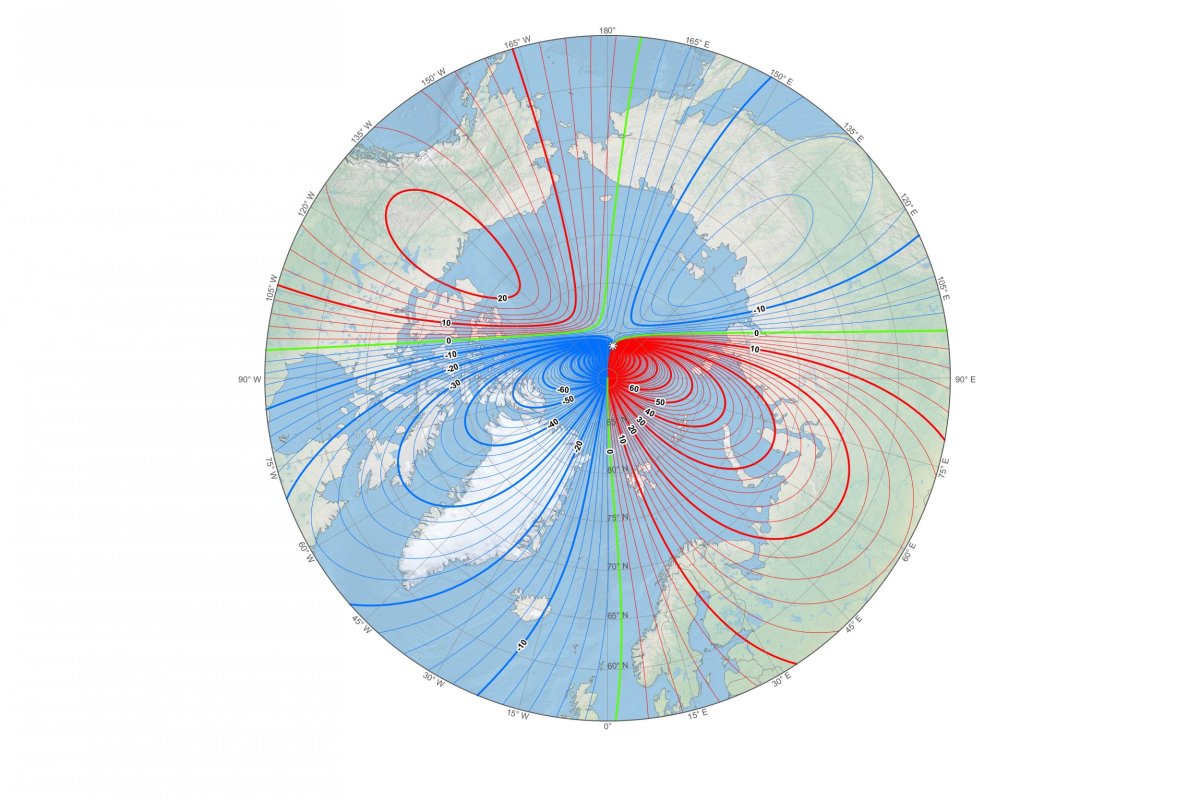Earth's northern magnetic pole is moving at an unexpectedly fast rate toward Siberia. Scientists discovered the pole was not where it should be in September last year, and, as a result, had to update the model that tracks its movements.
The World Magnetic Model (WMM) is a representation of Earth's magnetic field. It is used extensively in navigation by the U.S. Department of Defense, the U.K. Ministry of Defense and many civilian systems—so knowing exactly where the northern and southern magnetic poles are is of paramount importance.
Scientists first recorded the position of the northern magnetic pole in 1831. Seventy years later, Roald Amundsen found it had shifted over 30 miles. Over the next century, the northern magnetic pole continued to move at an average speed of 6 miles per year. This has sped up to around 25 miles per year in recent decades.
At the moment, the northern magnetic pole is moving away from the Canadian Arctic and toward Siberia.
To keep up with the changing position, the WMM is updated every five years. The last version was released at the end of 2014 and was expected to last until 2020. However, last year users said the model had "become inaccurate in the Arctic region," a statement from the British Geological Survey said.
Scientists have now released an update to the WMM to account for the unexpected movement of the northern magnetic pole. "Due to unplanned variations in the Arctic region, scientists have released a new model to more accurately represent the change of the magnetic field," a statement from the U.S. National Oceanic and Atmospheric Administration (NOAA) said. "This out-of-cycle update before next year's official release of WMM2020 will ensure safe navigation for military applications, commercial airlines, search and rescue operations, and others operating around the North Pole."
The NOAA said the WMM is used by the military, NASA, the Federal Aviation Administration and the U.S. Forest Service for mapping, navigation, and air traffic management. It is also used by smartphone providers for GPS, maps and compass apps. The military uses the WMM for undersea and aircraft navigation, parachute deployment, and more. Other governmental organizations, such as NASA, the Federal Aviation Administration, U.S. Forest Service, and many more use this technology for surveying and mapping, satellite/antenna tracking, and air traffic management.
The NOAA said Earth's magnetic field changes because of "unpredictable flows in Earth's core. The north polar region is experiencing one of these erratic changes."

Exactly why the northern magnetic pole is moving at a faster rate is not clear. Now the WMM has been updated, researchers are working to understand the changes.
Phil Livermore, a geophysicist at the University of Leeds, in the U.K, told The New York Times: It's clear that something strange is happening."
Earth's magnetic field is known to get stronger and weaker over time—for example, 565 million years ago it almost collapsed completely. It also flips every now and then, with the North and South poles reversing: "If you were alive about 800,000 years ago, and facing what we call north with a magnetic compass in your hand, the needle would point to 'south,'" NASA explains.
The unusual behavior documented at the northern magnetic pole has led some scientists to consider whether the poles are starting to reverse again. But Peter Olson, a geophysicist at Johns Hopkins University, told The New York Times he does not think this is the case. "It's the analogy between a stock market correction and a worldwide depression," he said. "How do you know the stock market today is not heading toward a worldwide depression, a crash? Well, it could be. But much more likely, it's a correction and it will rebound."
Uncommon Knowledge
Newsweek is committed to challenging conventional wisdom and finding connections in the search for common ground.
Newsweek is committed to challenging conventional wisdom and finding connections in the search for common ground.
About the writer
Hannah Osborne is Nesweek's Science Editor, based in London, UK. Hannah joined Newsweek in 2017 from IBTimes UK. She is ... Read more
To read how Newsweek uses AI as a newsroom tool, Click here.








